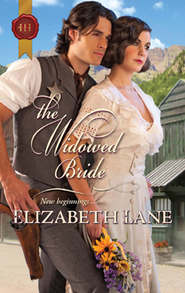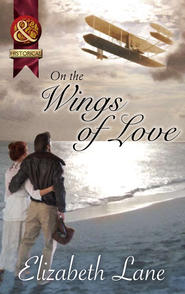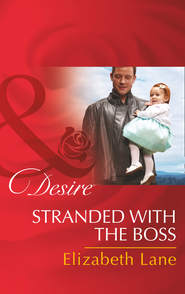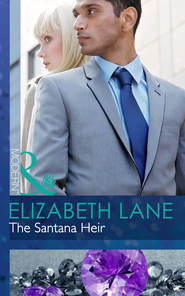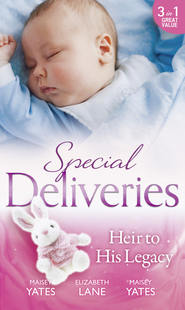По всем вопросам обращайтесь на: info@litportal.ru
(©) 2003-2025.
✖
The Horseman's Bride
Настройки чтения
Размер шрифта
Высота строк
Поля
“But I take it you’re not so … trusting.” He was playing with her now, brazenly confident that he could twist her around his finger. Damn his lying hide! He’d probably charmed her grandmother the same way.
If it weren’t for the stallion, she’d run him off the property with a bullwhip!
“Let’s just say I’m not a fool,” she snapped.
“I can see you’re not. And neither is your grandmother. She doesn’t keep that loaded shotgun by the door for nothing. If she thought I had any intention of harming her, I’d be picking buckshot out of my rear.”
“We’ll see about that!” Out of patience, she kneed the colt to a gallop. Tanner didn’t try to follow her, but as she shot across the pasture, Clara became aware of a sound behind her. Even without looking back, she knew what it was.
The wretched man was laughing at her!
Jace watched her ride away, her delicious little rump bouncing in the saddle. Miss Clara Seavers was one sweet little spitfire. He’d enjoyed teasing her, but now it was time to back off and leave her alone. The last thing he needed was that bundle of trouble poking into his past.
Mrs. Mary Gustavson was a fine woman. He would miss her conversation and her cooking. But as soon as he finished the work she needed done it would be time to move on. There would be other towns, other farms, other pretty girls to tease. As long as there was a price on his head, nothing was forever. Not for him. It was keep moving or face his death at the end of a rope.
At least his sister Ruby and her two little girls would be all right.
Hollis Rumford had been considered a fine catch when she’d married him ten years ago. Heir to a farm equipment company, he’d been as charming as he was handsome. But his infidelity, drunkenness and abuse had made Ruby’s life a living hell. Jace had seen the ugly bruises. He had dried his sister’s tears. Lord help him, he wasn’t the least bit sorry Hollis was dead. But he would always be sorry he hadn’t acted sooner. Maybe if he’d taken Ruby and her daughters away from that monster, he’d still have his old life—his friends, his fine apartment in Springfield, his work as a field geologist and engineer and a future in politics that might have taken him all the way to the Missouri Statehouse or the U.S. Congress. Marriage to Eileen Summers, the governor’s niece, would have opened many doors. Now those doors were closed to him forever.
But he hadn’t acted in vain, Jace reminded himself.
Now Ruby would be a respectable widow with a fine house and plenty of money. After a proper mourning period, she’d be free to find a new husband—a decent man, God willing, who’d treat her well and be a good father to her girls.
That had to be worth something, didn’t it?
Clara found her grandmother seated on the porch in her old cane rocker, her hands busy peeling a bucket of potatoes from the root cellar.
“Hello, dear.” Mary Gustavson was tall and raw-boned, her thick white hair swept back from her wrinkled face. Blessed with strong features and cornflower-blue eyes, she looked like an older version of her daughter Hannah, Clara’s mother.
“Good morning, Grandma.” Clara swung off her horse, looped the reins over the hitching rail and bounded up the steps to give the old woman a hug. Mary had raised seven children, buried a husband and baby and worked the farm alone for the past nineteen years. Loss and hard times had burnished her spirit to a serene glow that radiated from her face. Clara and her younger siblings, Daniel and Katy, adored her.
“I was just thinking about you, and here you are.” Even after decades in America, Mary spoke with a lilting Norwegian accent. “Sit down and visit with me awhile.”
“Wait, I’ll help you with those potatoes.” Clara hurried into the house and returned with an extra paring knife. Sitting on the edge of the porch, she picked up a potato. As she sliced off thin strips of peel, she wondered how best to bring up the subject of her grandmother’s new hired man.
“So how is your family?” Mary asked. “Are they all well?”
Clara nodded. “Daniel’s got a girlfriend in town. He’s pestering Papa to let him drive the car so he can take her for a ride.”
Mary chuckled. “I can hardly believe it! It seems like yesterday he was pulling on my apron strings.”
“My pesky little brother is sixteen. I can hardly believe it myself. And Katy, at the wise old age of thirteen, says she’s never going to let a boy kiss her for as long as she lives.”
“Oh, my! That will change in a year or two.”
Clara cut up the peeled potato, dropped it in the kettle and picked up another one. “Not too soon, I hope. Sometimes I think she has the right idea.”
“And what about you?”
Clara glanced up into Mary’s narrowed, knowing eyes. She knew that expression well. Her grandmother had always sensed when something was troubling her. What was she seeing now? Bright eyes? A hot, flushed face?
“I take it you’ve met my new hired man,” Mary said.
Chapter Two
Clara felt the heat rise in her face. If she could feel it, she knew her grandmother could see it. “He’s fixed the pasture fence,” she said. “I very nearly rode Foxfire into the new barbed wire. Whose idea was it to fix that fence anyway? The wire’s been down for years.”
“It was Tanner’s. But when he brought it up, I thought it was a good idea. I’m getting too old to chase your family’s calves out of my garden.”
“Oh, dear! Why didn’t you say something, Grandma? If we’d known about the calves, my dad would’ve fixed that fence a long time ago.”
Mary shrugged. “Judd is a busy man. I didn’t want to bother him about such a little thing. But never mind, it will be fixed now.”
“I suggested to Tanner that he put in a gate. That way we can still cut across the pastures when we come to visit you.”
“Oh? And what did he say to that?”
“He said he’d have to ask the boss.”
“He did, did he?” Mary chuckled as she picked up another potato. “I must say, I like a man who knows his place.”
Clara sighed. This wasn’t going at all well. “Grandma, what possessed you to hire him? He’s a drifter, and you don’t know anything about him. He could be a criminal, waiting for a chance to rob you.”
“Oh? And what would he steal?” Mary’s hands worked deftly as she talked. “The little money I have is safe in the bank. If the man needed food, he’d be welcome to all he could carry. As for the rest, look around you, child. What do I have that’s worth taking? My clothes? My pots and pans? My garden tools?” Her eyes twinkled. “My virtue, heaven forbid? Look at me. I’m an old woman. And whatever else Tanner may be, he’s a gentleman.”
Clara resisted the urge to grind her teeth. The look she’d seen in Tanner’s cobalt eyes was not the look of a gentleman. “What makes you say that?” she asked.
“I offered to let him sleep upstairs, in the boys’ old room. He insisted on laying out his bedroll in the hay shed. Didn’t want folks to gossip, he said.”
Clara groaned inwardly. As if anyone would gossip about her grandmother letting hired help sleep upstairs! Tanner’s excuse had been designed to flatter her and win her confidence. He probably slept outside in case he needed to make a fast getaway. She was becoming less and less inclined to trust the man.
“Why didn’t you tell us you needed help?” she asked. “We could’ve sent a couple of the ranch hands over to do the work. My father would have paid them.”
“I know, dear.” Mary quartered a peeled potato and dropped the pieces into the cooking pot. “But you know I don’t like accepting charity, even from my own family. Tanner needed work, and I …” A smile creased her cheek. “To tell you the truth, I liked the young man right off. And I enjoy his company over supper at night. It’s nice having somebody to talk to.”
Clara forced herself to take a long breath before she spoke. “How long does he plan to be here?”
“We haven’t talked about it. But once he’s made a little money, I expect he’ll move on. He doesn’t strike me as the sort of man to take root in one place.” Mary glanced into the pot. “I believe that’s enough potatoes for now. Give me a minute to put them on the stove, dear. Then we can go on with our visit.”
She pushed forward to rise from her rocker, but Clara had already picked up the pot. She stood, laying her knife on the porch rail. “I’ll do it, Grandma. You stay and rest.”
Swinging through the screen door, she strode into the kitchen. The interior of the house was shabby but comfortable. Mary could have bought new dishes and furniture, but the chipped plates, scarred table and mismatched chairs held precious memories of her husband and children. As Mary was fond of saying, the pieces were old friends and they served her well enough.
In the kitchen, Clara covered the potatoes with water, added a pinch of salt and set the pot on the big black stove to boil. Her grandmother would be waiting outside, but the quiet house held her in its calm embrace, urging her to linger. Savoring the stillness, she wandered into the parlor, where framed photographs of Mary’s family covered most of one wall.
Clara knew them well. Here was Reverend Ephraim Gustavson, her mother’s younger brother who’d gone off to Africa to be a missionary. And here, on the left was a ten-year-old photograph of her own family—her mother, Hannah, and her handsome, serious father, Judd, with their three children. The two younger ones, Daniel and Katy, were almost as fair as their mother. In their midst, Clara looked like a gypsy changeling. But then, her paternal grandfather had been dark. He’d died long before Clara was born, but she’d seen his picture. Tom Seavers had looked a lot like his younger son Quint—Clara’s adored favorite uncle.
Here was Uncle Quint in the photograph taken on his wedding day. He was devilishly handsome with dark chestnut hair, twinkling brown eyes and dimples that matched Clara’s. His bride, Aunt Annie, was Mary’s second daughter. More delicate than her sister Hannah, she had dark blond hair, intelligent gray eyes and a practical disposition that balanced her husband’s impulsive ways.






